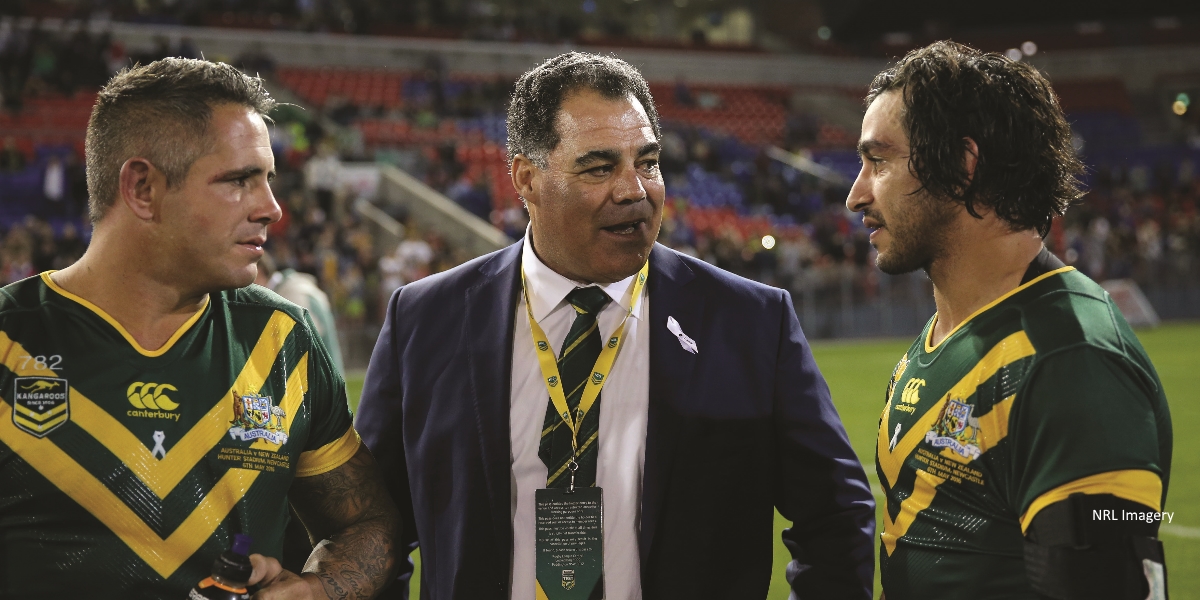Article from Men of League Magazine – June 2016
Mal Meninga drove not just the greatest era by a Queensland team but a renaissance in the tradition and historical significance of Origin football. Now he wants to do the same with the Australian team. BY STEVE RICKETTS
Mal Meninga says winning a premiership is the biggest thrill of a player’s career but representing your country will always be the greatest honour.
Meninga, who made a record four Kangaroo tours of Britain and France, two as skipper, wore the green and gold with pride in 46 Test matches between 1982 and 1994.
Now, as Australian coach, he is passionate about the green and gold jumper regaining the status it enjoyed for so many years as the most prestigious jersey in the 13-man code.
The sight of Australian teams taking the field at grounds such as Old Trafford in England, Gilbert Brutus Stadium in France or Auckland’s Carlaw Park sent a collective shiver down the spines of spectators, who had come to expect nothing but the best from the proud Kangaroos.
Liverpool’s Anfield Stadium will be the venue for this year’s Four Nations’ final, with Australia, England, Scotland and New Zealand to contest the series.
“Crowds in Britain are second to none, with State of Origin at Suncorp Stadium possibly the exception here in Australia,” Meninga said.
“Australian rugby league sides have an enormous reputation in the UK, and not just in the traditional league areas.
“Tests at Wembley in 1990 and ‘94 attracted national media interest and it was wonderful to have literally thousands of Australians there on supporters’ tours.
“I know player welfare is a such a big thing now and we can’t go back to the full scale tours of the past.
“But we can still develop an element of those great tours, whether it is in the northern hemisphere, New Zealand or the Pacific. When was the last time an Australian team played a game in New Zealand, outside of a Test?
“We’re only limited by our imagination.”
Meninga, who will have his own office in the new QRL Central offices in Brisbane, said it was important the game’s stakeholders gathered around the table to decide the future of the international game.
“People need certainty in terms of a schedule, so they can plan ahead for supporters’ tours and the like,” Meninga said. “I understand there will be hundreds, if not thousands of supporters from the UK here for the World Cup next year.
“That will be great, because they add so much to the atmosphere.”
Meninga was first named for Australia in 1982, for the first Test against the touring Kiwis at Brisbane’s Lang Park.
He spent the entire 80 minutes on the bench, so did not get a ‘cap’, having to wait until the return clash at the Sydney Cricket Ground for that honour. However, he dislocated his elbow early in the contest.
“It wasn’t a great start to my Test career, but getting that jumper from (coach) Frank Stanton meant everything to me,” Meninga said.
“These days I keep hearing everyone say I’d love to play for Queensland or NSW, but there is no mention of Australia. It’s frustrating, because I care greatly about the state of international football.
“There’s a fair bit of work for me to do in that regard. Origin has become a huge beast, but even when I coached Queensland, or played for Queensland, I never saw it as the be-all and end-all.
“I always thought the green and gold jersey was the ultimate in personal recognition, because it meant you were the best player in your position.”
In 2008 Meninga and Immortal and former St George star Reg Gasnier were named as centres in Australia’s Team of the Century, the ultimate green and gold combination.
That same year, the centenary of the code in Australia, New Zealand won the World Cup, and today they are ranked the number one side in the world.
Meninga said he was disappointed that critics and supporters discussed Origin selections almost from day one of the premiership, even though the Trans-Tasman Test was to be played in Newcastle on May 6, this year more than three weeks before Origin I.
“I didn’t see the first television ad promoting the Test until the week before. Origin was being pumped up from the start of the season,” he said. “You hear commentators say, ‘he’s an Origin player’, rather than ‘he’s a Test player’.
“They’ve got things the wrong way round.
“International football is the reason rugby league is the major football code on the eastern seaboard. Before Sydney and Brisbane club football was televised, it was the almost annual tours by quality British, Kiwi and French teams which kept our code to the forefront.
“My father [Norman] played for Wide Bay and Burnett against the strong 1960 French side, and he said that was a great experience.”
Meninga revealed his father was chosen for Queensland two years later, but had to withdraw because of an injury at the sawmill where he worked, his spot going to another bush footballer John Wittenberg, who went on to play for Australia.
Who knows what might have happened if Norman had got his chance for Queensland. Perhaps he might have also worn the green and gold like his famous son.








